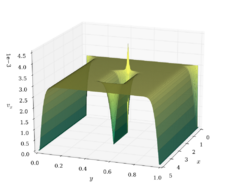Carathéodory's existence theorem
| Differential equations |
|---|
 |
| Classification |
| Solution |
In mathematics, Carathéodory's existence theorem says that an ordinary differential equation has a solution under relatively mild conditions. It is a generalization of Peano's existence theorem. Peano's theorem requires that the right-hand side of the differential equation be continuous, while Carathéodory's theorem shows existence of solutions (in a more general sense) for some discontinuous equations. The theorem is named after Constantin Carathéodory.
Introduction
Consider the differential equation
- [math]\displaystyle{ y'(t) = f(t,y(t)) }[/math]
with initial condition
- [math]\displaystyle{ y(t_0) = y_0, }[/math]
where the function ƒ is defined on a rectangular domain of the form
- [math]\displaystyle{ R = \{ (t,y) \in \mathbf{R}\times\mathbf{R}^n \,:\, |t-t_0| \le a, |y-y_0| \le b \}. }[/math]
Peano's existence theorem states that if ƒ is continuous, then the differential equation has at least one solution in a neighbourhood of the initial condition.[1]
However, it is also possible to consider differential equations with a discontinuous right-hand side, like the equation
- [math]\displaystyle{ y'(t) = H(t), \quad y(0) = 0, }[/math]
where H denotes the Heaviside function defined by
- [math]\displaystyle{ H(t) = \begin{cases} 0, & \text{if } t \le 0; \\ 1, & \text{if } t \gt 0. \end{cases} }[/math]
It makes sense to consider the ramp function
- [math]\displaystyle{ y(t) = \int_0^t H(s) \,\mathrm{d}s = \begin{cases} 0, & \text{if } t \le 0; \\ t, & \text{if } t \gt 0 \end{cases} }[/math]
as a solution of the differential equation. Strictly speaking though, it does not satisfy the differential equation at [math]\displaystyle{ t=0 }[/math], because the function is not differentiable there. This suggests that the idea of a solution be extended to allow for solutions that are not everywhere differentiable, thus motivating the following definition.
A function y is called a solution in the extended sense of the differential equation [math]\displaystyle{ y' = f(t,y) }[/math] with initial condition [math]\displaystyle{ y(t_0)=y_0 }[/math] if y is absolutely continuous, y satisfies the differential equation almost everywhere and y satisfies the initial condition.[2] The absolute continuity of y implies that its derivative exists almost everywhere.[3]
Statement of the theorem
Consider the differential equation
- [math]\displaystyle{ y'(t) = f(t,y(t)), \quad y(t_0) = y_0, }[/math]
with [math]\displaystyle{ f }[/math] defined on the rectangular domain [math]\displaystyle{ R=\{(t,y) \, | \, |t - t_0 | \leq a, |y - y_0| \leq b\} }[/math]. If the function [math]\displaystyle{ f }[/math] satisfies the following three conditions:
- [math]\displaystyle{ f(t,y) }[/math] is continuous in [math]\displaystyle{ y }[/math] for each fixed [math]\displaystyle{ t }[/math],
- [math]\displaystyle{ f(t,y) }[/math] is measurable in [math]\displaystyle{ t }[/math] for each fixed [math]\displaystyle{ y }[/math],
- there is a Lebesgue-integrable function [math]\displaystyle{ m : [t_0 - a, t_0 + a] \to [0, \infty) }[/math] such that [math]\displaystyle{ |f(t,y)| \leq m(t) }[/math] for all [math]\displaystyle{ (t, y) \in R }[/math],
then the differential equation has a solution in the extended sense in a neighborhood of the initial condition.[4]
A mapping [math]\displaystyle{ f \colon R \to \mathbf{R}^n }[/math] is said to satisfy the Carathéodory conditions on [math]\displaystyle{ R }[/math] if it fulfills the condition of the theorem.[5]
Uniqueness of a solution
Assume that the mapping [math]\displaystyle{ f }[/math] satisfies the Carathéodory conditions on [math]\displaystyle{ R }[/math] and there is a Lebesgue-integrable function [math]\displaystyle{ k : [t_0 - a, t_0 + a] \to [0, \infty) }[/math], such that
- [math]\displaystyle{ |f(t,y_1) - f(t,y_2)| \leq k(t) |y_1 - y_2|, }[/math]
for all [math]\displaystyle{ (t,y_1) \in R, (t,y_2) \in R. }[/math] Then, there exists a unique solution [math]\displaystyle{ y(t) = y(t,t_0,y_0) }[/math] to the initial value problem
- [math]\displaystyle{ y'(t) = f(t,y(t)), \quad y(t_0) = y_0. }[/math]
Moreover, if the mapping [math]\displaystyle{ f }[/math] is defined on the whole space [math]\displaystyle{ \mathbf{R} \times \mathbf{R}^n }[/math] and if for any initial condition [math]\displaystyle{ (t_0,y_0) \in \mathbf{R} \times \mathbf{R}^n }[/math], there exists a compact rectangular domain [math]\displaystyle{ R_{(t_0,y_0)} \subset \mathbf{R} \times \mathbf{R}^n }[/math] such that the mapping [math]\displaystyle{ f }[/math] satisfies all conditions from above on [math]\displaystyle{ R_{(t_0,y_0)} }[/math]. Then, the domain [math]\displaystyle{ E \subset \mathbf{R}^{2+n} }[/math] of definition of the function [math]\displaystyle{ y(t,t_0,y_0) }[/math] is open and [math]\displaystyle{ y(t,t_0,y_0) }[/math] is continuous on [math]\displaystyle{ E }[/math].[6]
Example
Consider a linear initial value problem of the form
- [math]\displaystyle{ y'(t) = A(t)y(t) + b(t), \quad y(t_0) = y_0. }[/math]
Here, the components of the matrix-valued mapping [math]\displaystyle{ A \colon \mathbf{R} \to \mathbf{R}^{n \times n} }[/math] and of the inhomogeneity [math]\displaystyle{ b \colon \mathbf{R} \to \mathbf{R}^{n} }[/math] are assumed to be integrable on every finite interval. Then, the right hand side of the differential equation satisfies the Carathéodory conditions and there exists a unique solution to the initial value problem.[7]
See also
Notes
References
- Coddington, Earl A.; Levinson, Norman (1955), Theory of Ordinary Differential Equations, New York: McGraw-Hill.
- Hale, Jack K. (1980), Ordinary Differential Equations (2nd ed.), Malabar: Robert E. Krieger Publishing Company, ISBN 0-89874-011-8.
- Rudin, Walter (1987), Real and complex analysis (3rd ed.), New York: McGraw-Hill, ISBN 978-0-07-054234-1.
 |

